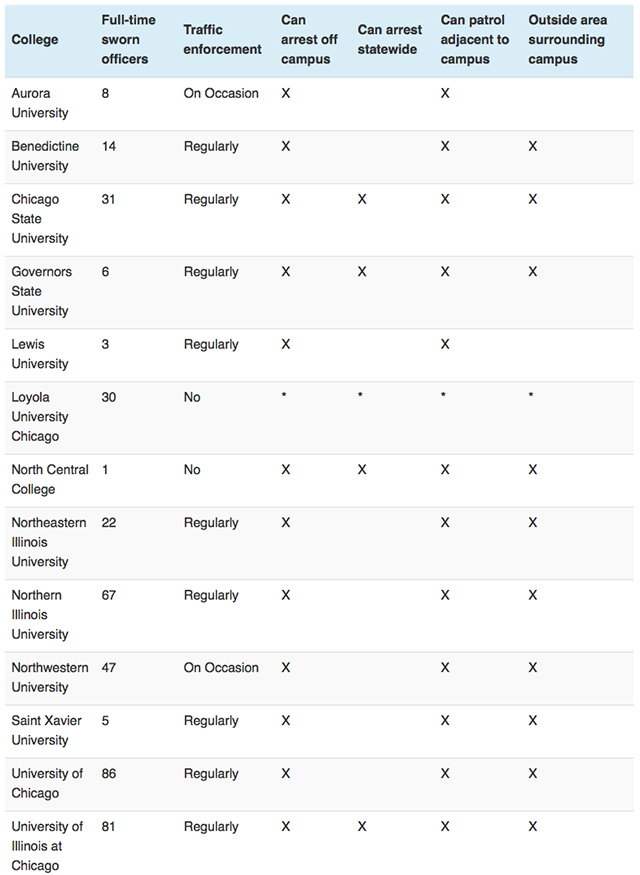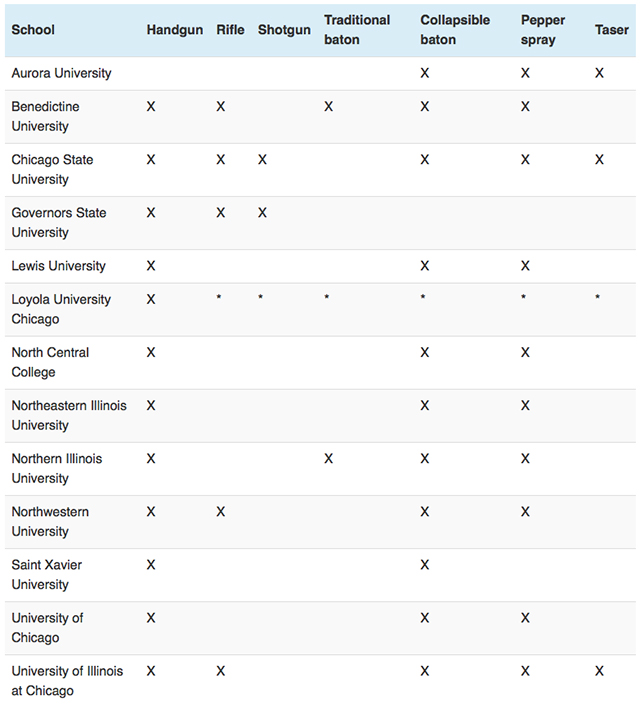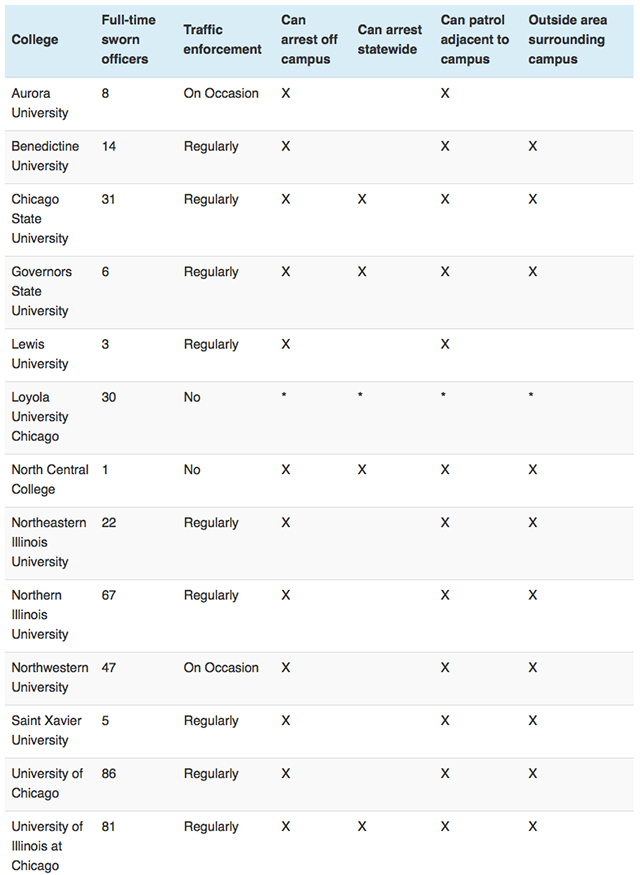During a press conference on July 29 announcing the indictment of a University of Cincinnati police officer for murder in the shooting death of an unarmed black man, the prosecuting attorney questioned whether colleges should employ police officers at all.
“I don’t think a university should be in the policing business,” Hamilton County prosecutor Joe Deters said flatly, after announcing the indictment.
Yet nationwide, more than two-thirds of colleges and universities with 2,500 or more students employ sworn, armed police officers, according to a Bureau of Justice Statistics report. More than 90 percent of public universities and nearly 40 percent of private universities have sworn police officers who have full arrest powers; most employ sworn officers who also are armed.
In the Chicago area, 13 of the 23 colleges and universities with 2,500 or more students have sworn police officers, according to a Reporter analysis of the BJS survey data. The data are a little old – the survey covers the 2011-2012 academic year – but they provide the most comprehensive and current look at the activities of campus police.
The largest sworn campus police force in the Chicago area is the University of Chicago’s, which had 86 full-time sworn officers in 2011-2012 (the University’s website now says the department has “approximately 100 sworn personnel”). U of C had more sworn officers than the University of Illinois at Chicago, even though the public university had almost twice as many students. The smallest sworn force was at North Central College, a small liberal-arts college in Naperville, which had just one full-time sworn officer.
All but one of the universities that employ sworn officers authorize them to carry handguns. Five departments authorize their sworn officers to use rifles, and two – Chicago State University and Governors State University – authorize sworn officers to use shotguns. Governors State is also the only university that allows its non-sworn officers, those without full arrest powers, to use guns; nonsworn officers there are authorized to use handguns, shotguns and rifles.
Interestingly, just three campus departments in the Chicago area – less than one-quarter of those with sworn officers – authorize their officers to use a Taser or similar device. Nationwide, 44 percent of sworn officers are authorized to use conducted energy devices, the generic term in the arms industry for Tasers. A 2011 report by the National Institute of Justice found that the use of Tasers can decrease the likelihood of injury to suspects by 70 percent.
Armed and Off-Campus
On July 27, in the wake of fallout over the University of Cincinnati shooting, the university’s president announced a new policy that will prevent campus police there from patrolling or conducting traffic stops off campus.
But in the Chicago area, all of the police forces with sworn officers have patrol and arrest jurisdiction in off-campus areas that are adjacent to campus, all but one have arrest powers further off campus, and four – UIC, Chicago State, Governors State and North Central – have statewide arrest jurisdiction. Loyola University Chicago didn’t respond to questions on the survey about jurisdiction.
Nine campus police departments with sworn officers said they “regularly” perform traffic stops, and two additional departments “occasionally” do so.
According to state Department of Transportation data, the Chicago area’s largest campus police forces made anywhere from hundreds to thousands of traffic stops in 2014. Chicago State made 154 traffic stops, while Northern Illinois University made more than 7,000 (with minority drivers getting stopped at twice the rate of white drivers).
University of Chicago, which logged more than 6,000 traffic stops in 2014 – more than 16 every day on average – instituted a new policy last fall intended to decrease the number of traffic stops by campus police, Chief Marlon Lynch told the Reporter in April. According to Lynch, officers are now only authorized to make a traffic stop if a safety or security risk is present.
New data released by the university shows that UCPD officers stopped just three drivers in all of June 2015 – and let them all off with verbal warnings.
But one of the problems that remain with campus police is that there is so little information about what they do and how they do it, particularly for those employed by private universities. A bill introduced in the Illinois House would have improved that by making private university police subject to public records laws, but the bill died in a Senate Committee in May.
Number and Activities of Sworn Officers at Chicago Area Universities, 2011-12
 (Source: Bureau of Justice Statistics Survey of Campus Law-Enforcement Agencies.)
(Source: Bureau of Justice Statistics Survey of Campus Law-Enforcement Agencies.)
Types of Weapons Authorized for Use by Sworn Officers at Chicago Area Universities, 2011-12
 (Source: Bureau of Justice Statistics Survey of Campus Law-Enforcement Agencies.)
(Source: Bureau of Justice Statistics Survey of Campus Law-Enforcement Agencies.)
The Chicago Reporter is a non-profit investigative news organization that focuses on race, poverty and income inequality.
Join us in defending the truth before it’s too late
The future of independent journalism is uncertain, and the consequences of losing it are too grave to ignore. To ensure Truthout remains safe, strong, and free, we need to raise $27,000 in the next 24 hours. Every dollar raised goes directly toward the costs of producing news you can trust.
Please give what you can — because by supporting us with a tax-deductible donation, you’re not just preserving a source of news, you’re helping to safeguard what’s left of our democracy.
